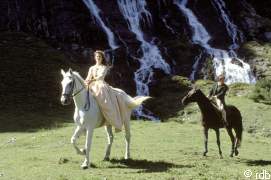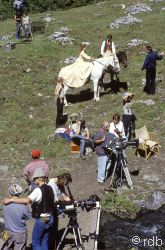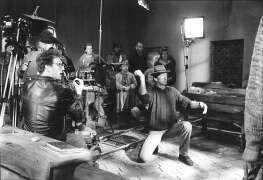
Synopsis
It's carnival in Munich, and Green Henry, a young Swiss art student, is
observing the goings-on with a mixture of revulsion and fascination. In the
midst of the chaos and noise he encounters his best friend, the sensualist
Dutch artist Lys, who is taking advantage of the masked parade to deceive
his fiancée Agnes with Rosalie, herself bent on enjoying her own carnival
experience. Henry takes Agnes under his wing when she is forced to watch aghast
as Lys recklessly betrays her, and, overcome by an agitation he cannot at
first understand, Green Henry challenges his friend Lys to a duel...
The duel is to take place at dawn.
As the appointed hour approaches, Green Henry recalls his youth in Zurich:
He reviews the untimely death of his father while out hunting, a death which
constitued an escape from Henry's mother's oppressive melancholy.
He remembers his cousin Anna, the love of his innocent youth, from whom he
received his first kiss while at school but who was forced for reasons of
health to retire with Henry's uncle's family to their country residence.
One fine day, a travelling theatre troupe comes to the environs of Zurich
to stage a production of Faust. Green Henry, drawn by his curiosity, is summarily
pressed into service in the magician scene, for which he must wear a monkey
costume. From his hiding place in the wings, he observes Judith, the young
actress playing the role of Gretchen, as she is forced to submit to the will
of her husband offstage. Once the show is over, too, Henry must remain despondently
in position, for his clothes have been stolen.
Judith takes pity on him and allows him into her bed, where, simultaneously
shocked and intrigued, Green Henry discovers at her side the magical power
of erotic love.
Upon arising the next day, Green Henry flees, naked, into the arms of his
mother...
During his youth, Green Henry apprentices as a painter with the eccentric
Römer, who cannot forgive Henry when he breaks off his study for reasons
having to do with his passion for Anna. Green Henry leaves Zurich and moves
in with his uncle in the country. Meanwhile Anna has become a spectacularly
beautiful young woman: At a series of occasions at which they are both present,
their love is rekindled as if they had never been separated. Green Henry,
however, is drawn equally to Judith, whom he has also coincidentally re-encountered.
She lives nearby alone, utterly cut off from the hubbub of society, and Green
Henry cannot resist the allure and compassion of his mistress in affairs of
the heart.
From this moment on he is tortured by his conscience, quite torn between
the two women as he is. And his inner conflict is only intensified when Anna
falls seriously ill.
When Anna dies suddenly, Green Henry swears undying love at her graveside.
He watches in disgust as the funeral dinner quickly becomes an uncontrolled
revelry including both family members and villagers, and grief and pain cede
to drunkenness and gluttony, to be totally neglected as the party begins to
sing and dance.
Green Henry flees to Judith's side, at once amorous and despairing, and
the couple enjoy another night of love.
In the morning he leaves her, as she fulfills a long-held wish and emigrates
to America. Green Henry, for his part, travels to Munich, where he is finally
able to return to his studies and his quest for freedom.
As he recalls his youth, Green Henry realises why he has so precipitously
challenged his friend Lys to a duel: His friend's betrayal of his fiancée,
enacted before his eyes, has reminded him of his own betrayal of Anna.
The duel takes place at dawn.
Once the two have crossed swords for the first time, the matter seems to
take a turn for the better, as Lys appears to have simply been making another
of his tasteless jokes. With grim resolve, however, Green Henry once again
takes up arms against the physically much superior Lys – only to be
fatally wounded. But as he dies, Green Henry's face wears an expression of
happiness and immeasurable satisfaction, for he knows that, in death, he is
to be reunited with his beloved Anna.
Commentary: Green Henry
Together with his screenwriter, the Hungarian author Peter Müller, Thomas
Koerfer has combined the characters of Judith and the actress into one single
figure. Such a decision may appear arbitrary to those who demand a faithful
adaptation of Gottfried Keller's Green Henry, but it is Koerfer's view that
a work of such stature and complication, as delightful as it is on occasion
wordy, cannot possibly be filmed "faithfully". The question is,
should one attempt to film it at all? Is Thomas Koerfer to be censured for
his lack of respect for the classics, a radical break with his more reverent
predecessors?
The reproach would be ill deserved, not only on account of Koerfer's many
years of experience with Keller's material, in addition to his proven ability
to adapt a literary text with a mixture of delicacy and invention, as witness
his treatment of Robert Walser's The Assistant.
The project is more than five years old, dating from Koerfer's first attempt
with Dieter Feldhausen, a co-author of the script for The Assistant. At the
time Koerfer was convinced that Keller's novel required a solid foundation
in "Alemannic" culture, and even considered filming it in Swiss-German
dialect.
Koerfer approached the material a second time with the help of Thomas Hürlimann.
The script began to develop in kaleidoscope-fashion, revolving around Gottfried
Keller, Green Henry and their epoch; and as a visual vocabulary evolved with
which to express the nineteenth century as precisely and meaningfully as possible,
yet the novel's main character was left seeming oddly detached.
Koerfer was at a loss to continue, and let the material rest, until he found
in Peter Müller a collaborator whose uncomplicated relationship with
Keller allowed him to help Koerfer prepare a viable screenplay. Müller,
who had written "Cable railway", a story about the death of an elderly
man in a mountain sanatorium, was already deeply immersed in the interaction
of Eros and Thanatos; indeed, Luchino Visconti had taken him on as a member
of the team working on the screenplay for his adaptation of Marcel Proust's
A la recherche du temps perdu (which was, however, never filmed).
The solution for Green Henry was to avoid saturating the film with high culture
and thus limiting its accessibility by requiring of its viewers an intimacy
with the novel and its period. The story's centre of gravity was now relocated
in the love affair between Henry and Anna, with multiple, concentrated references
to the expansive section "A Tale of Youth" from the first version
of Green Henry. In Koerfer's film, the "tale of youth" develops
as a sequence of flashbacks, framed by the carnival in Munich, the "city
of art", and closing with Henry's death.
This death, however, is not that of the failed, impoverished artist, returning
home to dissolve in shame at his mother's grave, laid low by the unpaid debt
he owes as her son. The film has Henry dying - or rather, invoking death -
in a scene that Keller did indeed include in his novel, but which has nothing
to do with his protagonist's death. What had been an episode featuring a duel
between Henry and Ferdinand Lys, his artist friend, now becomes a very fight
to the death. For this is a Henry who challenges death, fully conscious of
his guilt towards Anna, whom he has betrayed, and still unable even after
her death to devote himself wholly to one love.
This is a different young man from the one we know in Keller's novel, with
his incapacity for emotional commitment. Koerfer and Müller find for
love, a decision the Henry of the novel lacks the courage to make. The two
female figures are introduced as a child and, as noted above, as a young woman,
so as to further concentrate Henry's love story with Anna and Judith.
This is a Henry who is united with Anna in death, this time for good. Koerfer
is well aware of the difficulties posed by his attempt to convey such a vision,
and yet he is led in his work by a motif of union that he identifies as central
to Keller's oeuvre in general, particularly as embodied in his novella "A
Village Romeo and Juliet".
International backing, cast and shooting locations
The profusion of locales, and especially interiors, required for the production
made the use of a studio a prerequisite. With the considerable support of
the film sponsorship programme of the German state of North Rhine-Westphalia,
such a studio was found in Bochum. Green Henry is in fact a Swiss, German
and French co-production, under the aegis of Condor Productions in Zurich.
Production costs are approximately one million Swiss francs.
The locations needed to establish the film in both its rural and urban scenery
are all stand-ins, the authentic places having too radically changed character
since the novel's era. "Munich" is represented by Potsdam - and
not only on account of the German state of Brandenburg's contribution to the
project. Nor is it because both the city and the canton of Zurich inexplicably
refused to co-finance the film that Zurich's old town is represented by the
"Quartier bas" in Freiburg im Üchtland: in fact, Zurich's renovated
façades would have come across looking far too kitschy in the film.
Judith's house, meanwhile, actually stands on the Ballenberg, in Switzerland's
open-air historical museum. The construction chosen is the "Adelbodenerhaus",
which, although completely different from the dwellings typical of Zurich's
lowlands, still breathes a certain charm, with its veranda and its stoop,
set in a landscape of steep ascent and dusky woodland walk, and projecting
just the right mood for Henry's encounter with Judith.
Assumpta Serna, crowned Spain's favourite actress, may not be the Judith
Keller imagined, a creature with large brown eyes, a mouth set above a full
chin, and heavy dark hair; and yet with her reddish locks she is every bit
as lovely a woman as her creator could have wished for. Mathias Gnädinger
is the corpulent uncle, and Thibault de Montalembert's Henry is a mixture
of youthful elegance and romantic sensibility.
As a filmmaker Thomas Koerfer radiates a quiet authority. He commands his
technical crew with the same steady hand he uses to elicit candour from his
actors; as they shoot a scene on the Ballenberg, for instance, they listen
intently to his instructions, following his subtlest nuance with patience,
bearing with him as he repeats the various takes, from total to medium shot
to close-up all the way to the most extreme detail. Koerfer is storing up
visual material for the cutting room, drawing out the most exquisite suggestiveness
from his subjects. The process requires patience and endurance, and the members
of cast and crew all do their part, taking their lead from cameraman Gerard
Vandenberg. Vandenberg most recently worked with Edgar Reitz, creating the
images for the second run of his "Heimat" series, and he is a master
of intensely precise, atmospherically perfect scenes.

 «Thomas Koerfer's artistic
commandment seems to have been: Thou shalt make a film that anyone can understand,
without having to be familiar with Gottfried Keller novel and its period.
«Thomas Koerfer's artistic
commandment seems to have been: Thou shalt make a film that anyone can understand,
without having to be familiar with Gottfried Keller novel and its period.